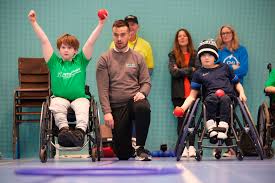The Psychological Benefits of Sports: How Physical Activity Enhances Mental Well-Being

Sports are often celebrated for their physical health benefits, but an equally important aspect is their powerful impact on mental well-being. Engaging in sports and physical activities is not only a way to stay fit, but it also offers valuable psychological benefits that can contribute to a happier and more balanced life. From reducing stress and anxiety to boosting self-confidence and social bonds, sports play a vital role in enhancing mental health across all ages. This article delves into the key psychological benefits of sports, the role of team dynamics in mental wellness, and how sports can be a tool for managing mental health challenges.
1. Stress Reduction and Anxiety Management
One of the most immediate benefits of participating in sports is its ability to relieve stress. Physical activity encourages the release of endorphins, also known as “feel-good” hormones, which can help reduce feelings of anxiety and create a more positive mood. When the body is physically active, it shifts focus away from daily worries, helping individuals clear their minds and feel more grounded.
a. Endorphin Release and Mood Enhancement
Endorphins are natural mood boosters released during exercise. This hormone not only helps combat feelings of stress but also leads to a sense of happiness and relaxation. The calming effect of endorphins can last for hours after exercise, making sports a natural and effective way to combat stress and anxiety without the need for medication.
b. Mindfulness and Focus
Sports encourage a state of mindfulness, especially in activities that require concentration, like yoga, martial arts, or even swimming. Being present in the moment helps individuals temporarily disconnect from their worries and fosters mental clarity. This mental focus during sports can contribute to long-term stress management skills, allowing individuals to face challenges with a calmer, more resilient mindset.
2. Boosting Self-Esteem and Confidence
Engaging in sports provides a sense of accomplishment, especially when individuals see improvements in their performance or physical abilities. Whether it’s achieving a personal record, mastering a skill, or contributing to a team’s victory, these achievements can build self-esteem and reinforce a sense of competence.
a. Setting and Achieving Goals
In sports, setting realistic and measurable goals is essential for progress. The act of setting and working toward a goal, whether it’s improving running speed or mastering a new technique in tennis, can significantly boost self-confidence. This sense of achievement is deeply empowering, helping individuals believe in their abilities and encouraging them to set higher goals both in sports and in life.
b. Positive Body Image
Participating in sports promotes a healthier perception of one’s body. Instead of focusing on societal standards or physical appearances, sports emphasize strength, endurance, and functionality. For many people, this shift in focus leads to a more positive body image, boosting self-confidence and promoting a more balanced perspective on physical health and self-worth.
3. Social Interaction and Building Connections
Sports often involve teamwork and social interaction, making them an excellent way to build connections and foster a sense of community. Team sports, in particular, promote trust, cooperation, and communication, which are essential for developing and maintaining relationships.
a. Developing Social Skills
Through sports, people learn to communicate effectively, collaborate with others, and build trust—all valuable social skills that extend beyond the playing field. For children and adolescents, these interactions help build foundational social skills, while adults benefit from the camaraderie and support of being part of a team or fitness community.
b. Reducing Loneliness
Participating in sports provides an opportunity to connect with others who share similar interests and goals. This sense of belonging can combat feelings of loneliness and isolation, particularly in individuals who may struggle with social anxiety. Sports teams, fitness classes, and even online fitness communities provide a supportive environment where individuals can connect, share experiences, and build meaningful relationships.
4. Discipline and Improved Focus
Engaging in sports requires commitment, discipline, and time management. These qualities are not only valuable in improving athletic performance but also translate into other areas of life, such as work, education, and personal responsibilities. By practicing discipline in sports, individuals learn the importance of structure and consistency, which can improve overall productivity and focus.
a. Time Management Skills
Athletes often need to balance training, personal life, and other responsibilities. This need for balance fosters strong time management skills, helping individuals become more organized and efficient. For students and working adults, the discipline gained through sports can improve focus and enable them to handle multiple tasks without feeling overwhelmed.
b. Mental Endurance and Resilience
Sports provide a setting to face and overcome challenges, from strenuous physical efforts to recovering from losses or injuries. Through sports, individuals learn resilience, patience, and perseverance—qualities essential for coping with setbacks in all areas of life. This mental endurance builds a “growth mindset,” where individuals view challenges as opportunities for improvement rather than obstacles.
5. Physical Activity as a Tool for Managing Depression
Several studies have shown that sports and regular physical activity can be effective in managing symptoms of depression. Exercise has been proven to increase the production of neurotransmitters such as dopamine and serotonin, which play a role in regulating mood and motivation. For people experiencing depression, engaging in sports can provide a sense of structure, purpose, and connection, which may help improve mental health.
a. Routine and Structure
The routines established in sports provide a sense of purpose and structure that can be especially beneficial for individuals dealing with depression. Engaging in regular sports activities offers a break from the cycle of negative thoughts and can serve as a productive, energizing outlet for emotions.
b. Social Support and Encouragement
For individuals with depression, social support is a crucial element of recovery. Being part of a sports team or fitness community offers a sense of support, understanding, and encouragement that can lift spirits and promote a positive outlook. Coaches, teammates, and fitness partners can be valuable sources of motivation, accountability, and connection.
6. Sports as a Form of Therapy: Physical Activity and Emotional Regulation
Participating in sports is a form of therapy for many, particularly for those dealing with stress, anxiety, or anger management issues. The physical outlet provided by sports can help individuals process emotions, regulate mood, and reduce the risk of emotional outbursts.
a. Anger Management and Emotional Control
High-energy sports like boxing, martial arts, or sprinting provide a safe space to release built-up emotions, helping individuals manage anger and frustration in a healthy way. By channeling energy into physical exertion, people learn to manage and control intense emotions, ultimately improving their emotional regulation.
b. Enhanced Coping Mechanisms
Sports teach individuals to handle pressure, overcome setbacks, and manage disappointment. This practice enhances coping mechanisms that are valuable for emotional well-being, reducing the risk of impulsive behaviors or negative coping strategies like substance abuse. Learning to manage stress through sports can build resilience, leading to healthier emotional responses in difficult situations.
7. Technology’s Role in Supporting Mental Wellness in Sports
The growth of wearable technology, mental wellness apps, and online communities has made it easier to access resources and track mental well-being in sports. These technological advancements not only help people stay physically fit but also support mental health by fostering motivation, community, and accountability.
a. Tracking Progress and Setting Goals
Wearable devices allow athletes to monitor their physical performance, track goals, and celebrate achievements. This progress tracking is a powerful motivator, encouraging athletes to remain committed to their goals while boosting self-confidence and satisfaction. The ability to see improvements over time reinforces a positive mindset and a sense of accomplishment.
b. Mental Wellness Apps and Online Support
Many mental wellness apps focus on mindfulness, breathing exercises, and guided meditations tailored for athletes. These tools allow individuals to incorporate mental health practices into their fitness routines, enhancing emotional control, focus, and relaxation. Additionally, online support groups and communities provide a platform for athletes to share experiences, offer encouragement, and promote a culture of mental wellness in sports.
Conclusion: Sports as a Pathway to Mental Health and Happiness
Sports offer a powerful means to promote mental well-being and cultivate essential life skills. From reducing stress and anxiety to fostering confidence, resilience, and social connections, the psychological benefits of sports are vast and long-lasting. For those facing mental health challenges, sports provide an accessible and effective way to improve mood, build discipline, and enhance emotional regulation.
As society becomes more aware of the importance of mental health, the role of sports in promoting psychological well-being will only continue to grow. Encouraging regular physical activity and integrating mental wellness practices into sports routines can help individuals achieve a balanced, healthy, and fulfilling life. In the journey toward mental wellness, sports are more than just a physical pursuit—they are a pathway to resilience, self-discovery, and lasting happiness.





